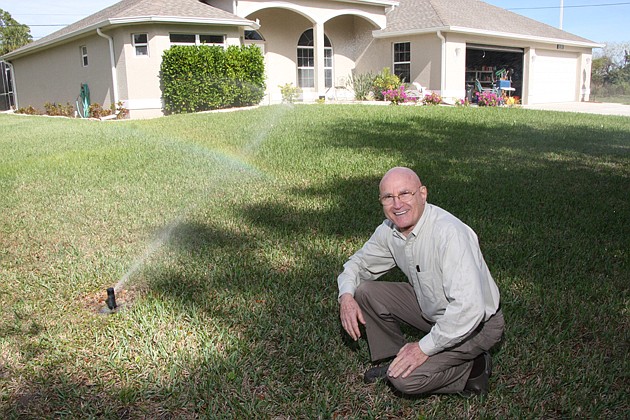Jack Tanner is about to accomplish something rare in politics: dissolving a government agency.
Tanner's six-year mission to shut down the wasteful Lee Soil and Water Conservation District is a lesson in how government programs get entrenched and how hard it is for citizens to dismantle them.
“It's a failure of the people who keep getting elected,” Tanner says. “People talk like they want less government, but when it comes down to it they don't vote that way. The last election proves it.”
Within the next two months, Florida Secretary of Agriculture Adam Putnam is expected to sign an order dissolving the conservation district, an agency whose only task was to provide free inspections of residential sprinkler systems. Under Tanner's leadership, the district refunded $100,000 to taxpayers over six years.
Some taxpayers were so surprised by the checks they received that they framed them. In fact, about $7,000 worth of refund checks were never cashed.
Tanner, 78, a libertarian who lives in north Fort Myers, sold his Fort Myers auto-parts business in 1995 and has been active in local politics. He started investigating the district in 2004 and found that it was wasting money on a mobile-irrigation lab with a full-time technician who earned $50,000 a year.
The technician was performing one inspection every other day and performing a task that private sprinkler companies could do just as well.
Created as conduits for federal and state funds for farmers, such soil and water conservation districts have mutated into slush funds for politicians and bureaucrats. The Lee Soil and Water Conservation District was formed in 1947.
So Tanner ran for office and was elected to the district board in 2004. By early 2007, more like-minded people won seats on the board, and together they voted to fire the staff and return to taxpayers the $100,000 that had built up in reserve.
Despite its modest budget and small size, when the board held the public hearing to return the money, about 20 municipal bureaucrats showed up to protest the move. In addition, the board sent a letter to the Lee County Commission requesting that it stop requesting federal government grants in the name of the board, which it had done in the past.
Once the board decided to return the money to taxpayers, that task proved surprisingly difficult. For one thing, the tax collector didn't have the authority to give the money back.
So Tanner decided the district would mail a $10 check to any property owner who requested one. To his surprise, 15,000 requests flooded in within a month, mostly via the Internet but as many as 1,000 by mail.
“The thing that took so long was trying to find a no-cost method of getting rid of the $100,000,” Tanner says. Tanner undertook the laborious task of verifying names and county residency, mailing checks himself on a first-come, first-served basis.
In 2010, to speed up the process, the board decided to hire a temporary employee to handle the refunds full-time. “That person sat there for eight hours a day for months,” says Terry Miller, who was elected chairman of the district that year.
Still, some taxpayers didn't cash their checks. After some discussion, the board decided to give the money to a local group that promotes trash composting.
Without money in the bank, politicians and bureaucrats no longer had any interest in the district, and the board voted to dissolve the agency earlier this year. The request has to be sent to Putnam, the agriculture secretary.
Putnam's office has to file a public notice announcing the plan to dissolve the district. Barring major opposition, Miller says Putnam has indicated he will sign the order within the next 45 to 50 days.
Looking back, Tanner and Miller say that municipal employees and politicians thwart citizen efforts to cut wasteful spending. For example, county politicians were using the district as a vehicle to request federal funds. “One of the problems that the organization faced is that they had a lot of money in the bank,” Miller says.
Municipal unions also tried to block them. “It's very difficult because the employees don't want to lose their jobs; they like it the way it is,” says Tanner. “It's probably the most influential group.”
Tanner says government often duplicates services, such as law enforcement and emergency services. For example, Tanner says there are 17 fire districts in Lee County each with its own administration and budget. He advocates consolidating those districts. “We have more in Lee County than any other in Florida,” he says. “You're talking about millions of dollars.”
To reduce wasteful government spending and cut programs, Tanner says more citizens must run for office. “First of all, you have to get people on the board to make that decision,” he says. “Board members need to do the job for the least amount of money.”






